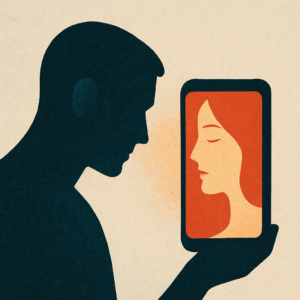🔒 Behind the Screen: Understanding Porn Addiction and Emotional Disconnect
 It begins in private—curiosity, late-night exploration, or stress relief. But over time, what seemed like a harmless habit turns into a compulsion, affecting mental health, relationships, and emotional intimacy.
It begins in private—curiosity, late-night exploration, or stress relief. But over time, what seemed like a harmless habit turns into a compulsion, affecting mental health, relationships, and emotional intimacy.
Porn addiction is one of the least talked-about behavioral addictions, especially in India, but its effects are very real and increasingly visible in psychiatric practice.
🧠 How Porn Becomes Addictive
Pornography stimulates the dopamine-reward system in the brain—just like gambling or drugs. It creates a loop of instant pleasure, detachment from real emotions, and a craving for more.
But here’s what makes it different:
-
It’s easily accessible, free, and anonymous.
-
It offers infinite novelty, with just a scroll or click.
-
It can become a coping mechanism for stress, loneliness, or emotional numbness.
Over time, the brain can become desensitized to normal cues of intimacy or arousal, leading to emotional and relational struggles.
🚩 Signs of Porn Addiction
-
Watching porn despite feeling guilt or regret
-
Needing more extreme content to feel satisfied
-
Using porn to escape boredom, stress, or loneliness
-
Failed attempts to reduce or stop
-
Trouble forming or sustaining real-life relationships
-
Decline in sexual performance or emotional connection
💔 The Impact on Relationships and Self-Image
Frequent porn use can lead to:
-
Reduced interest in real partners
-
Performance anxiety
-
Low self-esteem and shame
-
Difficulty with emotional bonding
-
Increased secrecy, isolation, and guilt
In couples therapy sessions I conduct in Chennai, I often hear one partner say, “It feels like I’m competing with a screen.” This emotional distance is real—and painful.
✅ Practical Steps to Regain Control
-
Identify triggers: Is it boredom? Stress? Loneliness? Recognize what’s behind the urge.
-
Set limits: Use tools like BlockSite or StayFocusd to restrict access.
-
Replace with real intimacy: Reconnect emotionally with partners or close friends.
-
Practice digital detox hours—especially at night.
-
Don’t go it alone: Talk to a therapist or join support groups. Shame thrives in silence.
🧍Case Vignette: A Common Chennai Story
R, a 29-year-old tech worker in Chennai, was watching porn every night to “de-stress.” He felt embarrassed, disconnected from his partner, and struggled with real intimacy.
In therapy, he uncovered long-standing emotional wounds and performance fears. With structured CBT, accountability, and self-compassion, he rebuilt his confidence and relationship.
👨⚕️ When to Get Help
If porn is affecting your mental health, focus, or relationships, you’re not alone—and it doesn’t mean you’re broken. It means you’re human, and you need support.
Therapy approaches like CBT, Acceptance & Commitment Therapy (ACT), and Mindfulness-based relapse prevention are proven to work.
📍 Support in Chennai Is One Step Away
Break free from compulsive patterns and reconnect with yourself and others.
📞 Book a confidential consultation today:
Dr. Srinivas Rajkumar T
Consultant Psychiatrist
📍Apollo Clinic – Velachery & Tambaram, Chennai
📧 srinivasaiims@gmail.com
📱 85951 55808
Don’t let screens steal your self-worth.
You deserve authentic connection.